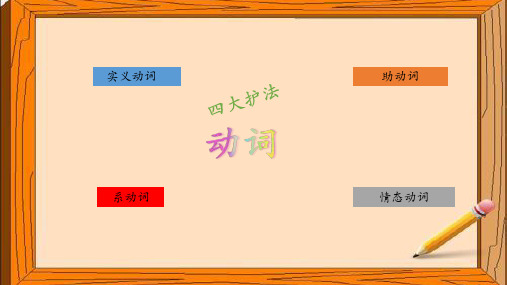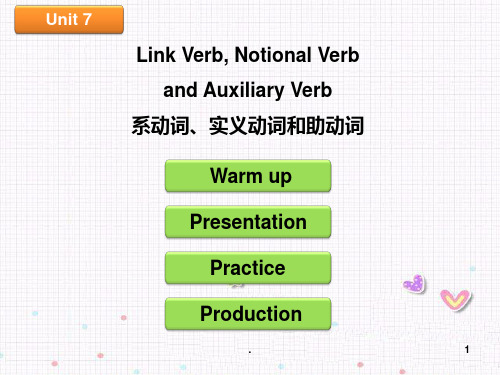初中英语语法-动词复习课件(PPT24张)
合集下载
【中考英语】专题复习课件:动词(30张ppt)

have构成现在完成时,shall,will表示将来时
be(am/is/are/was/were)
1.I am watering the flowers. 帮助构成(现在/过去)进行时。 2.Tom was hit by his father yesterday. 帮助构成被动语态。 小测试: She is Lily.(is 是助动词吗?) 答案:NO.
必须
must/have to
不得不
1.must表个人意志和主观上的必要,意 为“必须”“应该”用于一般现在时; I must go now. 2.have to表客观上的必要。意为“必 须”“不得不” 除可用于现在时外,还可以表将来时 shall/will have to和过去式had to。
1.这台电视机不能用了,我们必须买 台新的。 This TV doesn’t work.We have to buy a new one. 2.那时我们必须买台新的。 We had to buy a new one. 3.我们将不得不买台新的。 We will have to buy a new one.
must • I _____study hard,because I want to go to Beijing University. have to • I _______go shopping,because the fridge is empty now.
should/would/ought to
• 1.Autumn is coming,the leaves ______yellow. turn looks • 2.The girl _______beautiful. • 3.The food_______delicious. tastes gets • 4.Autumn is coming,it______colder and colder. • 5.That song ________ sounds well.
最新人教版英语中考复习动词 (共28张PPT)教育课件

A. give up B. stay up C. cheer up
2. As time ______, you’ll come to think of English as your friend and love it.
A. stop
B. reach
C. stops D. reaches
2. I like music that I can dance ______ .
A. from B. by
C. with D. to
3. How can I _____ there?
A. get
B. get to
C. arrive in D. go to
19
(4) need用作情态动词: • 主要用于否定句、疑问句和条件句,表示“需要”,也可以作实义动词,后跟名词、
代词、不定式、动词-ing形式等。need开头的一般疑问句,肯定回答用must。 • 例如: • You needn’t come if you are busy. 如果忙,你就不必来了。(情态动词) —Need I come tomorrow? 我明天需要来吗? —No, you needn’t. / Yes, you must. 不,没必要。/ 是的,你必须来。(情态动词)
3
例句呈现
• My mother gives me a new bike as the birthday present. • (give后跟双宾语me和a new bike) • The teacher made his students happy by doing some games. • (made后跟宾语his students和宾语补足语happy)
A. is ; of
中考英语语法全方位复习——动词 (共21张PPT)

may和might
1.都表示“可能,可以,请求,许可,祝愿”, might的语气较为委婉。 对may开头的问句,肯定回答用Yes,you may.或Yes, please. 否定回答用No,you mustn’t./No,you can’t. Your homework. -May I use your pen? -Yes, you may./No, you mustn't/can’t. May you be happy.
动词+副词 宾语是名词,可置于副词后面,亦可置于动词和副词之间。 宾语是人称代词和反身代词,只能置于动词和副词之间。如: wake up, put down, turn on, turn down, pick up, work out, threw away, think over, find out, give up, put on, take off, look up, bring up, set up等He walked out the math problem. = He walked the mast problem out. Don't wake me up. (不说Don't wake up with me. )
考点3 情态动词
情态动词表示讲话人的情感、态度和语气。本身具有 一定的意义,但不能独立作谓语,没有人称和数的变 化,且后面必须跟动词原形。
can和be able to
1.两者都表示“能,可能,可以”。be able to可以 用于各种时态,can没有将来时和完成时。 can和它的过去式could还可表示请求和猜测。 He will be able to tell you the news soon. -Could I have the TV on? -Yes, you can./No, you can't. He couldn't be a bad man.
初中英语语法-动词复习课件(PPT24张)

B. must
C. dare
D. would
visited 1. They ________ (visit) the museum last week. has made (make) many friends since she came to Paris. 2. Zhang Hong ________ will go 3. She ________ (go)to the cinema with her classmates tomorrow evening. sleeps 4. John is always busy. He ________ (sleep) only six hours very night. is raining (rain) now. 5. Stay here; boy; don't go out. It ________
☆ should 表示义务、责任 We should obey traffic rules. ☆ shall
征求意见(第一人称)
Shall we go shopping today?
警示、命令、允诺(第二、三人称)
You shall hand in your homework on time.
will vs would
☆
描述状态变化过程
He is getting worse and worse.
The man fell asleep two hours ago. It's growing warm. Maple trees turn red in autumn.
The sun rose red. She stopped and stood quite still. The book lay open on the table. He married young.
中考英语语法大全——动词(共26张PPT)

6.need need表示“需要”,常用于否定句和疑问句中,由need 引出疑问句,肯定回答用must,否定回答用needn’t。 ---Need we take the test? ---Yes, we must.
7.have to have to表示“必须,不得不”,有人称、数和时态的变化,变为 否定句和疑问句时,要用助动词do,does,did来构成。have to多 强调由于客观需要而“不得不”;而must多强调主观上的原因。 I always have to worry about how I appear to others. 8.shall (1)shall表示征询意见,用于第一、三人称的疑问句中。 Shall Jim go there with me tomorrow? (2)shall用于第二、三人称,表示说话人给对方的许诺、命令、 警告、威胁等。 You shall pay for it.
(3) have的用法 助动词在句中有人称,数和时态的变化,主要是与过去分词一起 构成各种完成时态和完成进行时态。 He has returned from abroad. As soon as we got to the station, the train had left. (4) will, would, shall, should的用法 助动词will, shall用于构成一般将来时,would, should用于构成 过去将来时。 He will be twenty years old next month. He said he would come. He told me that I should succeed in the future.
(2) 表示感官的连系动词 常用来表示感官的联系动词有look, feel, taste, smell, sound等。 This kind of clothes feel soft. Your words don't sound right. (3) 表示变化或结果的连系动词 常用来表示变化或结果的连系动词有become, fall, get, go, grow, turn等。 The country is getting richer and richer. The leaves have turned yellow.
初中英语语法—动词PPT课件

_tr_a__n_s_f_e__r,__b_e__c_a_m__e__________________________________
助动词:_w_i_ll_, _h_a_v_e_n_’_t,_s_h_o_u_l_d_,_d_o_e_s_,_d_i_d_n_’t_____________
.
9
Practice Oral Practice
用所给词的适当形式填空,并朗读句子 My parents ___a_r_e___ (be) at home now, but they ___w_e_r_e__ (be) in the park just now.
I ___d_o_n_’t__l_ik_e__ (not like) cats, but my mother ___l_ik_e_s_______ (like) cats.
I like fruit. He has got three big toys.
否定句:
主语+助动词do/does+not+实义动
词原形+其他
主语+主动动词not+动词形式+其他
句 型 结 构
一般疑问句: 助动词Do/Does+主语+实义动词原 形+其他? 助动词+主语+动词形式+其他?
I don’t like fruit. He won’t go fishing. Do you like fruit? Have you ever read this book?
结 一般疑问句:Be+主语+其他? Is he a police officer?
构
他是警察吗?
特殊疑问句:
初中英语语法——四大基本时态课件(共24张ppt)

____(ring, ra√ng, rung).
现在进行时使用环境、句型变化
★作谓语的动词用来表示动作(情况)发生时间的 各种形式称为时态。
★概念:表示现阶段或说话时正在进行的动作及行 为。
★时间状语:Now, at this time, days, look. listen等时 间状语做标志。
★基本结构:主语+be +doing +其他 ★否定形式:主语+be +not +doing+其他 ★一般疑问句:把be动词放于句首。
事,正要做某事。 ⑤某些动词,可用进行时态表将来,如come,
现在进行时的用法
1)、现在(说话的瞬间)正在进行或发生的动作,强调“此时此刻” E.g. He is reading . They are talking now.
2)、当前一段时间内的活动或现阶段正在进行的动作。 E.g. They are working these days.
3)、 某些动词的现在进行时,表预定的计划或即将发生的动作。 E.g I am coming.
一般现在时--句型变化
❖ ③含有be动词的要在be上做变化.
❖
Danny is a good student. 陈述句
❖
丹尼是个好学生。
❖
Danny isn't a good student. 否定句
❖
丹尼不是个好学生。
❖
Is Danny a good student? 一般疑问句
❖
丹尼是个好学生吗?
此句中给出的do指“做,干”, not指把此句变为否定句, 故须在do前加助动词don't。
做题时常见错误五、对主语的数判断有误
现在进行时使用环境、句型变化
★作谓语的动词用来表示动作(情况)发生时间的 各种形式称为时态。
★概念:表示现阶段或说话时正在进行的动作及行 为。
★时间状语:Now, at this time, days, look. listen等时 间状语做标志。
★基本结构:主语+be +doing +其他 ★否定形式:主语+be +not +doing+其他 ★一般疑问句:把be动词放于句首。
事,正要做某事。 ⑤某些动词,可用进行时态表将来,如come,
现在进行时的用法
1)、现在(说话的瞬间)正在进行或发生的动作,强调“此时此刻” E.g. He is reading . They are talking now.
2)、当前一段时间内的活动或现阶段正在进行的动作。 E.g. They are working these days.
3)、 某些动词的现在进行时,表预定的计划或即将发生的动作。 E.g I am coming.
一般现在时--句型变化
❖ ③含有be动词的要在be上做变化.
❖
Danny is a good student. 陈述句
❖
丹尼是个好学生。
❖
Danny isn't a good student. 否定句
❖
丹尼不是个好学生。
❖
Is Danny a good student? 一般疑问句
❖
丹尼是个好学生吗?
此句中给出的do指“做,干”, not指把此句变为否定句, 故须在do前加助动词don't。
做题时常见错误五、对主语的数判断有误
人教版初中英语语法知识学习课件PPT之动词和动词短语语法学习PPT

live up to不辜负
look down on看不起
run out of 用完
考点学习
5.动词+名词+介词
make fun of取笑
pay attention to注意
take care of照顾
make use of利用
take pride in为……感到自豪
6.动词+介词+名词
go to school去上学
go to bed去睡觉
keep in mind记住
keep under control控制
考点学习
常见的动词短语归纳
1.look短语 look at看 look up查阅;向上看 look back回顾 look through浏览
look for寻找 look around环顾 look after照顾 look over查看,检查
考点学习
have 意为"必须,不得不",用于强调客观需要。如:My mother is ill. to I have to look after her at home. 常用于疑问句,意为"需要"。如:Need I leave now?
need 否定形式为needn’t,意为"不必"。如:You needn’t worry about Jim. He is not a child any more.
考点学习
9.go短语
go off(警报器等)突发巨响,停止运作
go on继续
go away离开
go by(时间)流逝 go over仔细检查
go up上升,增长
go after追求,追赶
- 1、下载文档前请自行甄别文档内容的完整性,平台不提供额外的编辑、内容补充、找答案等附加服务。
- 2、"仅部分预览"的文档,不可在线预览部分如存在完整性等问题,可反馈申请退款(可完整预览的文档不适用该条件!)。
- 3、如文档侵犯您的权益,请联系客服反馈,我们会尽快为您处理(人工客服工作时间:9:00-18:30)。
☆
描述状态变化过程
He is getting worse and worse. The man fell asleep two hours ago. It's growing warm. Maple trees turn red in autumn.
The sun rose red. She stopped and stood quite still. The book lay open on the table. He married young.
用法
例句
必须
I must go now.
must
表推测 “一定”
--- Someone is koncking the door. --- It must be Tom.
“must” 在句首的疑问句 --- Must I finish the homework today?
答句不能用mustn't
B
表推测 can/must/might/may
C
表请求 D should/shall/may
半情态动词
E
need/dare
表必要性 need/have to
He can play basketball. 表能力 “能,会”
Mary went to Shanghai last week, so she can't be here. 表猜测、怀疑 用于否定、疑问句
I like very much. I like English very much.
They call me. They call me Mary.
Please pass me. Please pass me the salt.
Horses run fast. He jumps very high.
实义动词 系动词
助动词 情态动词
Patrick Star is eating a hamburger.
表示动作或者状态的词
The boy still stands here.
护法一号
实义动词
☆ 定义: 能独立作谓语的动词
☆ 分类
及物动词 (vt)〖延续性〗 不及物动词 (vi)〖非延续性〗
及物动词后必须加宾语
They will have a meeting tomorrow.
would will 的过去式
Would you tell me the way to the
表示过去的意愿或委婉的询问 station.
情态动词练习
1. John___ come to see us tonight, but he isn't very sure yet.
用系动词的适当形式填空
looks
1. You _______very young.
2. At first those questionssee_m__e_d____ easy, but later I found them difficult.
3. 4.
MAfyteyrotuhnegseprobrrtostlmhooeekres_ti_n_g_, h_e_____a_s_t_u_d_e_nvt elarysttyireeadr..
☆ shall 征求意见(第一人称) Shall we go shopping today? 警示、命令、允诺(第二、三人称) You shall hand in your homework on time.
will vs would
用法
例句
1.请求、询问(第二人称)
2. 意愿 will
将来时
Will you pass me the book? We will do anything thing for you.
A. may
B. can
C. has to
D. must
2. They ___ do well in the exam.
A.can be able to B. be able to C. can able to D. are able to
3. —May I take this book out? —No, you___.
--- No, you needn't/ don't have to.
☆ 情态动词: 表示“需要、必须” Need I do the exercise now? --- Yes, you must. / No, you needn't.
用need 提问时,肯定回答为 must,否定回答为 needn’t或don’t have to
I could swim when I was 7 years old. can的过去式,表示过去的能力
may & might
☆ 可能,也许 He may/ might come tomorrow. might 语气更弱
☆ 表请求(might 语气更委婉) May I come in? --- No, you mustn't/ can't. (不可以,禁止)
A. can't
B. may not C. needn't D. aren't
4 .You___ go and see a doctor at once because you're got a fever.
A.can
B. must
C. dare
D. would
1. They _v_is_it_e_d___ (visit) the museum last week. 2. Zhang Hong _h_a_s _m_a_d_e_ (make) many friends since she came to Paris. 3. She __w_il_l _go___ (go)to the cinema with her classmates tomorrow evening. 4. John is always busy. He __s_le_e_p_s__ (sleep) only six hours very night. 5. Stay here; boy; don't go out. It _i_s _r_ai_n_in_g_ (rain) now.
6. She often __d_o_es____ (do) her lessons after supper. 7. Hurry up! The train _w_i_ll_le_a_v_e_ (leave) in five minutes. 8. They _a_r_r_iv_e_d__ (arrive) in London on the night of April 30, 1989. 9. While we __w_e_re__ta_l_k_in_g (talk) in the room, the light suddenly went out. 10. They _h_a_v_e_l_ea_r_n_e_d_ (learn) about 200 English words since this term.
looks
9. The mooncake ________good.
tastes 10. The meat _________ bad.
tastes
护法三号 助动词
I was doing my homework all afternoon. Many trees are planted in the park last Sunday.
助动词 will/shall
助动词 be
They will leave in two hours. I shall be 16 years old next year.
I have learned English for 8 years. 助动词 have/has/had
护法三号 情态动词
A 表能力 can/could
谢谢欣赏
5. When we_____w_a_s_ up, we're going to help build up our country.
grow 6. The flowers __________very sweet.
smell 7. Her face ________red.
turns
8. Jack ________very happy.
不及物动词无需接宾语
Mike is studying Maths. Mike studies hard.
有些动词既是及物动词又是不及物动词
有s些tu不dy及物动词与其他词构成短lik语e 时,作用相当于ke一ep个及物动词
turn off
learn
work
leave
pick up
swim
fly
vt
☆ 实义动词: sb. need(s) sth. 某人需要某物 sb. need to do sth. sth. need doing 某事需要被做 = sth. need to be done
should vs shall
☆ should 表示义务、责任 We should obey traffic rules.
vi
护法二号
感官类 系动词
系动词
状态类 系动词
系动词
动态系 动词
双谓语 系动词
feel taste
smell look
☆ be ☆ seem ☆ keep ☆ stay
I am a student. They seem quite happy. We need to keep fit. The window stayed open all the night.
